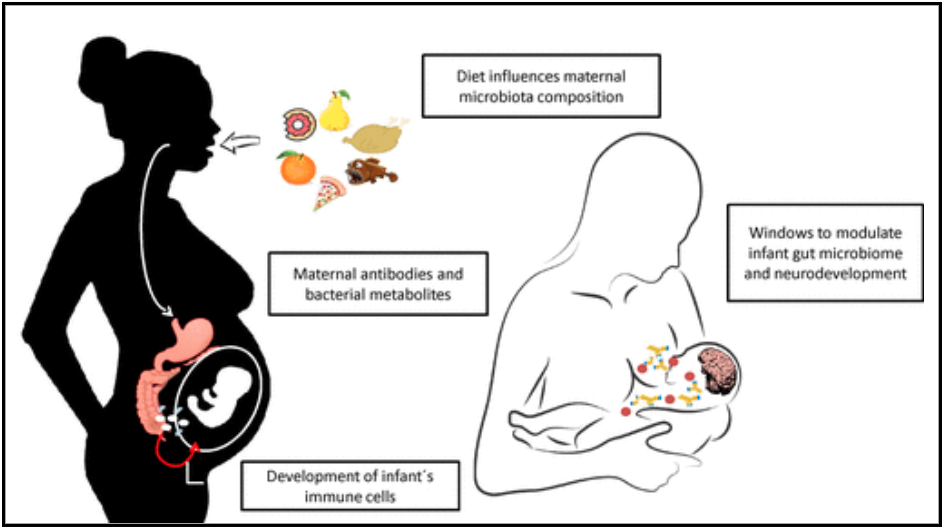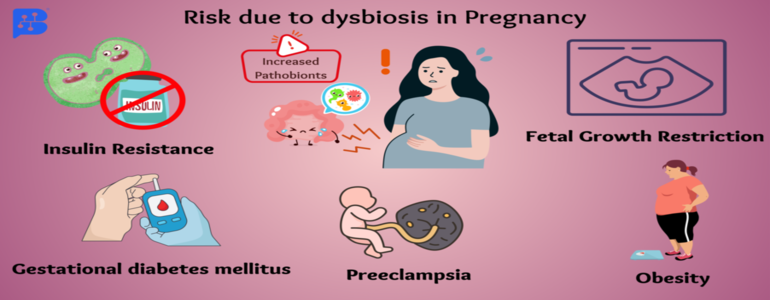- June 13, 2023
- Shruti Garg
- Microbiome and Lifestyle
Gut Microbiome in Maternal Health: An In-depth Exploration
The gut microbiome, a complex ecosystem of microorganisms residing in the human digestive tract, plays a crucial role in maintaining overall health. Recent research has highlighted the significance of the gut microbiome in various physiological processes, including maternal health. This aims to provide an in-depth exploration of the relationship between the gut microbiome and maternal health, focusing on its influence during pregnancy, labour, and the postpartum period. Understanding the dynamic interplay between the gut microbiome and maternal health holds promising implications for optimizing pregnancy outcomes and promoting maternal well-being.

1. Gut Microbiome Composition During Pregnancy:
1.1 - Hormonal Influences:
a. Oestrogen and progesterone levels during pregnancy affect the gut microbiome composition.
b. Hormonal fluctuations create an environment that supports specific bacterial growth.
1.2 - Dietary Modifications:
a. Pregnancy induces changes in dietary habits, impacting the gut microbiome.
b. Increased intake of certain nutrients and fibre affects bacterial diversity.
1.3 - Immune System Adaptations:
a. Maternal immune system undergoes adaptations to support foetal development.
b. These changes influence the gut microbiome composition during pregnancy.
1.4 - Increased Microbial Diversity:
a. Studies suggest that microbial diversity increases during pregnancy.
b. Higher diversity may be beneficial for maternal and foetal health.
2. Impact of Gut Microbiome on Pregnancy Outcome:
2.1 - Gestational Weight Gain:
a. Dysbiosis, an imbalance in gut microbial composition, may contribute to excessive weight gain.
b. Dysbiosis leads to inflammation and insulin resistance, affecting metabolic health.
2.2 - Gestational Diabetes:
a. Imbalances in gut microbial composition are associated with an increased risk of gestational diabetes.
b. Dysbiosis contributes to inflammation and insulin resistance, impairing glucose metabolism.
2.3 - Preterm Birth:
a. Certain gut bacteria produce metabolites that influence uterine contractions and cervical ripening.
b. Dysbiosis may contribute to an increased risk of preterm birth.
3. Gut Microbiome and Maternal Immune System:
3.1 - Immune Tolerance:
a. Gut bacteria interact with immune cells, contributing to immune tolerance.
b. Immune tolerance is crucial during pregnancy to prevent adverse immune responses against the foetus.
3.2 - Preeclampsia:
a. Dysbiosis has been linked to an increased risk of preeclampsia.
b. Dysbiosis leads to immune dysregulation and inflammation, contributing to preeclampsia.
3.3 - Maternal-Foetal Immune Activation:
a. Altered gut microbiome is associated with maternal-fetal immune activation.
b. Maternal immune activation can increase the risk of neurodevelopmental disorders in the offspring.
4. Gut Microbiome in Postpartum Health:
4.1 - Hormonal Fluctuations and Mood:
a. Hormonal changes in the postpartum period influence the gut microbiome.
b. Gut microbiome affects the production of neurotransmitters, impacting maternal mood.
4.2 - Lactation:
a. Gut microbiome influences breast milk composition.
b. Beneficial bacteria in the gut contribute to the synthesis of important nutrients in breast milk.
4.3 - Mode of Delivery:
a. Vaginal delivery and caesarean section have differing impacts on the establishment of the infant's gut microbiome.
b. Mode of delivery influences the transmission of maternal microbiota to the newborn.
4.4 - Postpartum Recovery:
a. A healthy gut microbiome is essential for postpartum recovery.
b. Promoting a healthy gut microbiome through dietary interventions and probiotics can aid in recovery.
Conclusion
The gut microbiome exerts a profound influence on maternal health throughout pregnancy, labor, and the postpartum period. Understanding the intricate relationship between the gut microbiome and maternal health holds promising potential for optimizing pregnancy outcomes, preventing complications, and promoting overall well-being. Future research should focus on elucidating the specific mechanisms underlying these associations and exploring targeted interventions, such as probiotic supplementation and personalized dietary recommendations, to modulate the gut microbiome and improve maternal health. By harnessing the power of the gut microbiome, we can enhance maternal care and ensure better maternal and foetal outcomes.








